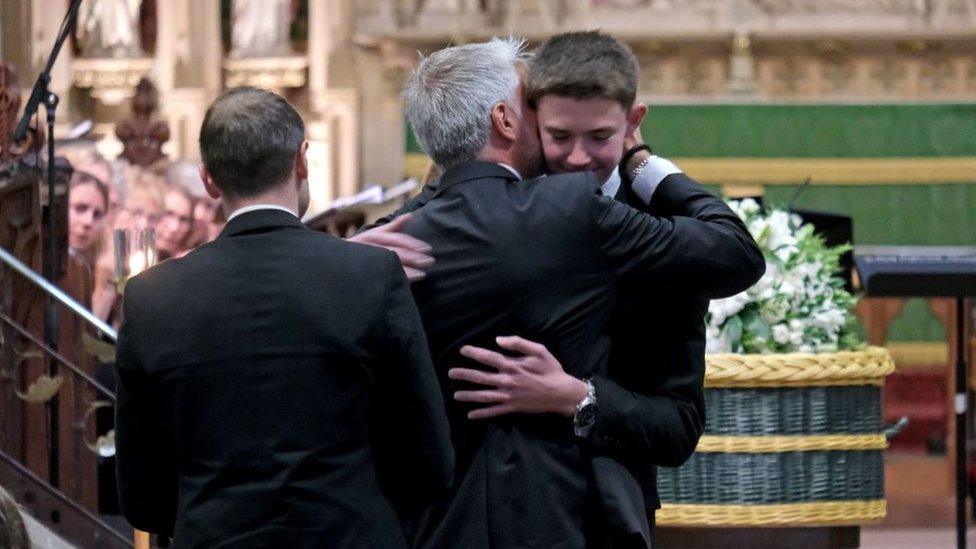Nottingham attacks: Families' anger as triple killer gets hospital order
- Published
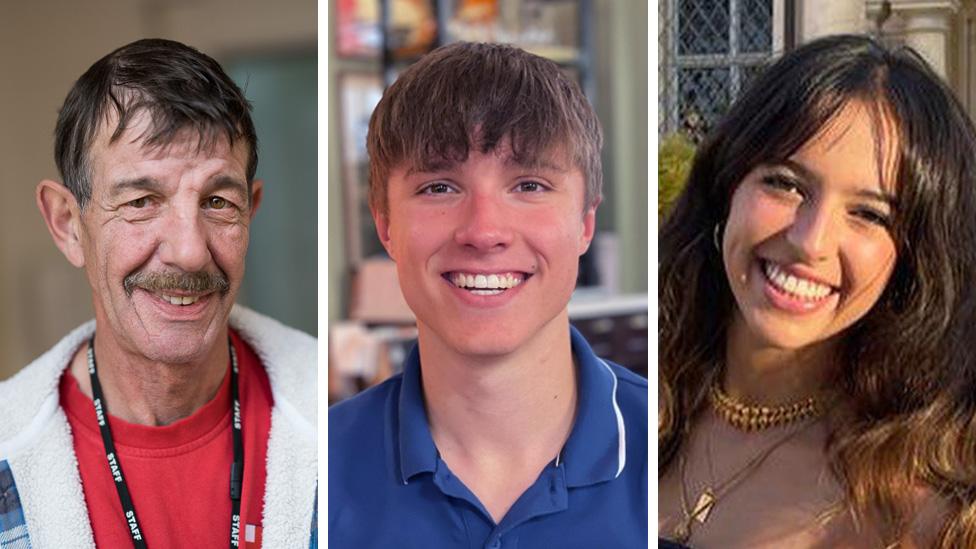
Ian Coates, Barnaby Webber and Grace O'Malley-Kumar died at the scene of the attacks
The families of those who died in the Nottingham attacks have expressed their anger after triple killer Valdo Calocane was given a hospital order.
Barnaby Webber and Grace O'Malley-Kumar, both 19, were fatally stabbed on 13 June along with Ian Coates, 65.
Their killer will be detained at a high-security hospital after admitting manslaughter on the grounds of diminished responsibility.
Mr Webber's mother said "true justice has not been served".
University of Nottingham students Mr Webber and Ms O'Malley-Kumar were fatally stabbed in Ilkeston Road just after 04:00 BST, while Mr Coates was found dead with knife injuries in Magdala Road after his van was stolen.
Pedestrians Wayne Birkett, Marcin Gawronski and Sharon Miller were then driven at in Milton Street and Upper Parliament Street, in the city centre.
The 32-year-old, who had been diagnosed with paranoid schizophrenia before the attacks, also pleaded guilty to three counts of attempted murder.
Footage shows timeline of Nottingham attacks and killer's arrest
Speaking outside Nottingham Crown Court following sentencing on Thursday, the victims' families voiced their anger at the outcome.
Emma Webber, the mother of Mr Webber, said "true justice has not been served today", adding the families had been "let down" by police and the Crown Prosecution Service (CPS).
She accused Nottinghamshire Police's Assistant Chief Constable Rob Griffin of having "blood on his hands", following the force's failure to detain Calocane after an arrest warrant was issued in September 2022, over an assault on an officer.
And she claimed the CPS had, in November, presented her family with "a fait accompli that the decision had been made to accept manslaughter charges".
"At no point during the previous five and a half months were we given any indication that this could conclude in anything other than murder," she said.
"We trusted in our system, foolishly as it turns out."
In response, a CPS spokesperson said it had met the families of Mr Webber and Ms O'Malley-Kumar online, and then again in person in December, with further offers to meet made "throughout".
They added: "Engagement with those who have been left bereaved is one of our highest priorities and in all cases, we continue to liaise with victims' families throughout the legal process."
Nottingham attacks: Victims' families react to triple killer's sentence
James Coates, son of Ian Coates, said his family had "suffered a great loss".
"The failures from the police, the courts and the health service have resulted in the murder of my father," he added.
And Grace O'Malley-Kumar's father, Dr Sanjoy Kumar, said: "We will never come to terms with the loss of our beloved daughter Grace, how she lost her life [and] her heroic actions."
He added: "While we have never questioned this man's diagnosis, the lack of toxicology, contemporaneous mental health assessment, as well as missed opportunities to divert his lethal path, will forever play on our minds and this requires further review."
On Thursday, the CPS set out why it decided to accept a diminished responsibility plea rather than continue to push for Calocane to be jailed for murder.
The CPS said medical experts provided "overwhelming" evidence Calocane was suffering from a serious mental health condition, including hearing voices in his head telling him his family would be harmed unless he did what they told him to do.
Three psychiatrists were asked to analyse Calocane's condition and all agreed it "impaired his ability to exercise self-control".
The CPS "took the unusual step" of asking a fourth expert to review those reports, and after they agreed with the findings, prosecutors concluded there was "no realistic prospect of conviction for murder".
The moment Valdo Calocane is sentenced at Nottingham Crown Court
Mr Justice Turner told Calocane he remained a danger and the sentence would "result in you being detained in a high-security hospital, very probably for the rest of your life".
"In the early hours of 13 June last year, you committed a series of atrocities in this city, which ended the lives of three innocent people," he said.
"Your sickening crimes both shocked the nation and wrecked the lives of your surviving victims and the families of them all."
He added the "central issue" was "whether at the time of committing these offences, you were suffering from symptoms of severe mental disorder".
The judge said, however, the psychiatric evidence did not detract from the "horror" and "disastrous" impact of the offences, but he said, in his view, Calocane's abnormality of mind "significantly contributed" to him perpetrating the attacks.
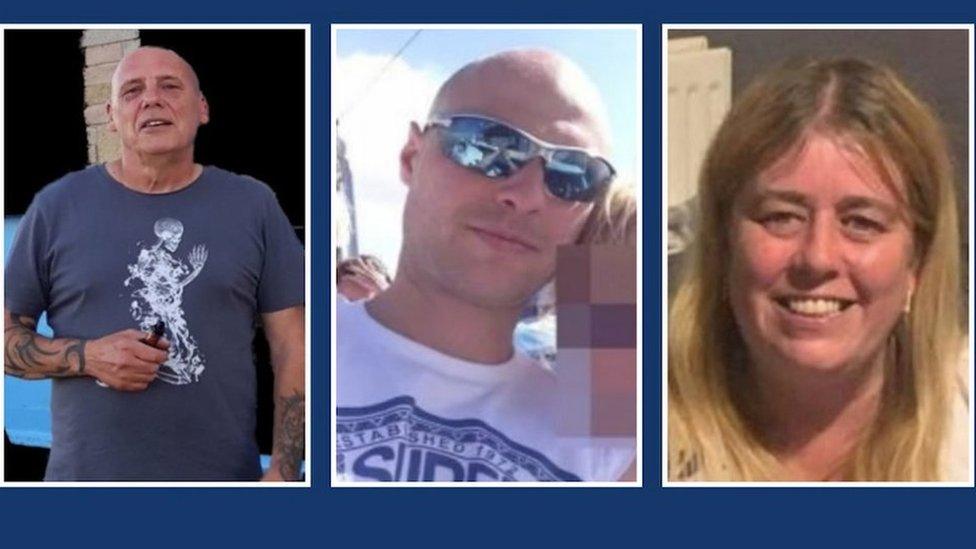
Calocane also admitted the attempted murder of Wayne Birkett, Marcin Gawronski and Sharon Miller, who were hit with a van
Prime Minister Rishi Sunak has sent his "heartfelt condolences" to the victims' families, but he declined to say whether he would order a public inquiry into the case.
He said: "It was an absolutely awful case and as a parent, you think when you send your kids out into the world or university they'll be safe. I can't imagine the pain they are going through at the moment."
Mr Sunak said it was "right" Calocane would "spend very probably the rest of his life" in a high-security hospital.
Lawyers for Mr Birkett, one of the pedestrians who suffered serious injuries when he was struck by the van, said he believed a public inquiry was required.
In a statement, they said he was disappointed with Calocane's sentence and that all the victims "have been let down by the system that is meant to protect them".
They said: "Wayne's life will never be the same. He will require extensive rehabilitation and care for many years to come."
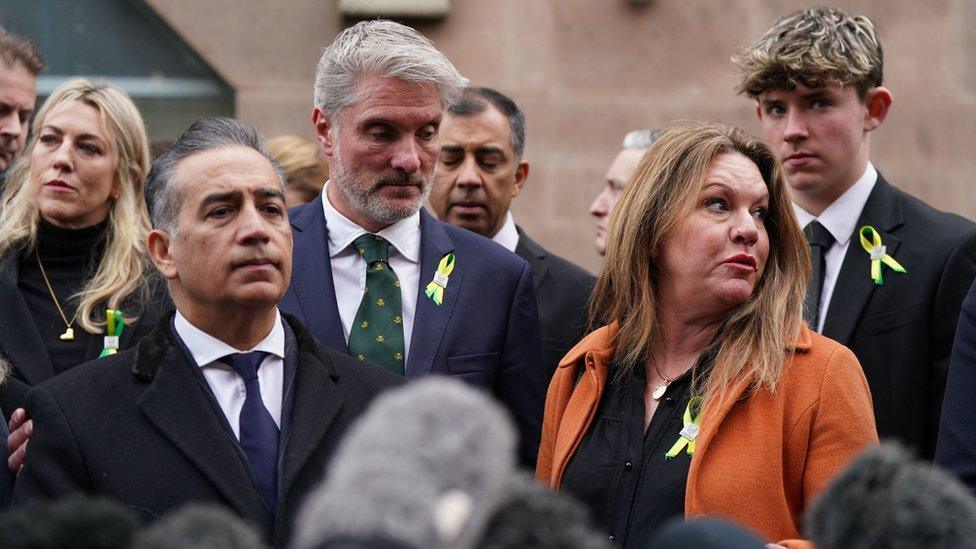
Families of the victims gave their reaction outside court on Thursday
In a statement, the University of Nottingham said it was continuing to support its community in coming to terms with the loss of Mr Webber and Ms O'Malley-Kumar, who "touched the lives so many".
It added it was committed to working with agencies in any reviews into how similar tragedies could be avoided in the future.
Nottinghamshire Healthcare NHS Foundation Trust chief executive Ifti Majid said the organisation had "robustly" reviewed its treatment of Calocane between May 2020 and September 2022.
"Once again, I wish to send my condolences and thoughts to everyone affected by this case," he said. "We will continue to work with our partners in the police and health services to continue to learn."
Meanwhile, an investigation by the police watchdog has concluded officers following Calocane in the van could not have foreseen he would drive at pedestrians.
The Independent Office for Police Conduct (IOPC) said its three-month review had not identified any conduct or performance issues in relation to the incident.
Nottinghamshire's police and crime commissioner Caroline Henry said the attacks were a tragedy that no-one could have foreseen.
However, she said she was seeking reassurance from Nottinghamshire Police over outstanding warrants.
She said she was confident the force delivered a good service overall but there was "always room for improvement".

'You could hear a pin drop'
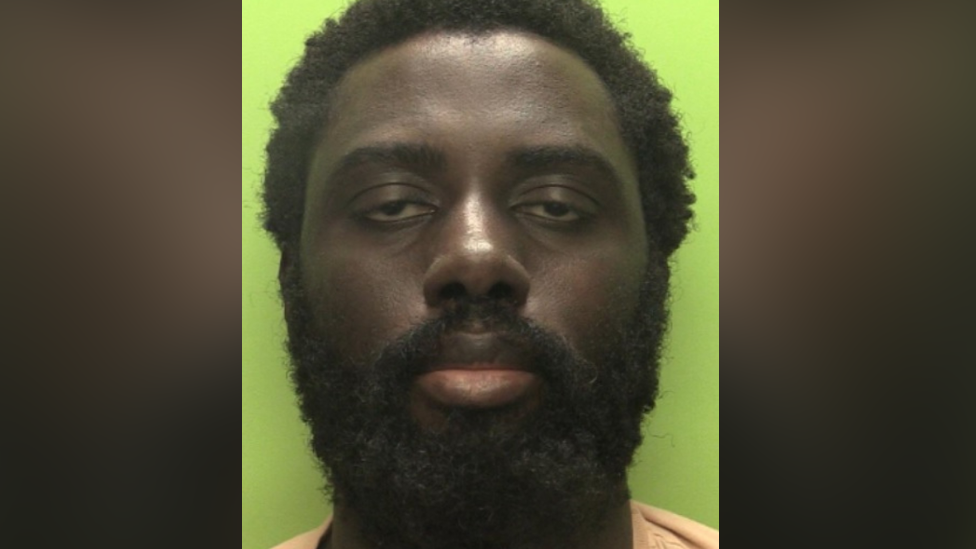
Valdo Calocane showed no emotion in the dock
By BBC reporter Katie Thompson, at Nottingham Crown Court
For what was a relatively short sentencing hearing, just over 30 minutes, it was no doubt a very long half an hour for the many friends and families of the three victims that filled court one.
There were well over 100 people packed in, and you could hear a pin drop as everyone listened on to the judge's remarks.
Some had their heads bent, some were crying and some had to leave the room.
Calocane stood as his sentence was handed down. A far cry from the bearded mugshot, he was clean-shaven, suited and wearing glasses and stared ahead throughout. His towering figure stood out. He showed no emotion.
Afterwards, people hugged. People sobbed. The red eyes were clear to see.
Then came the family statements outside court. The raw emotion of the words of James Coates, Emma Webber and Sanjoy Kumar was felt by all in the media scrum.

Follow BBC East Midlands on Facebook, external, on Twitter, external, or on Instagram, external. Send your story ideas to eastmidsnews@bbc.co.uk, external
Related topics
- Published25 January 2024
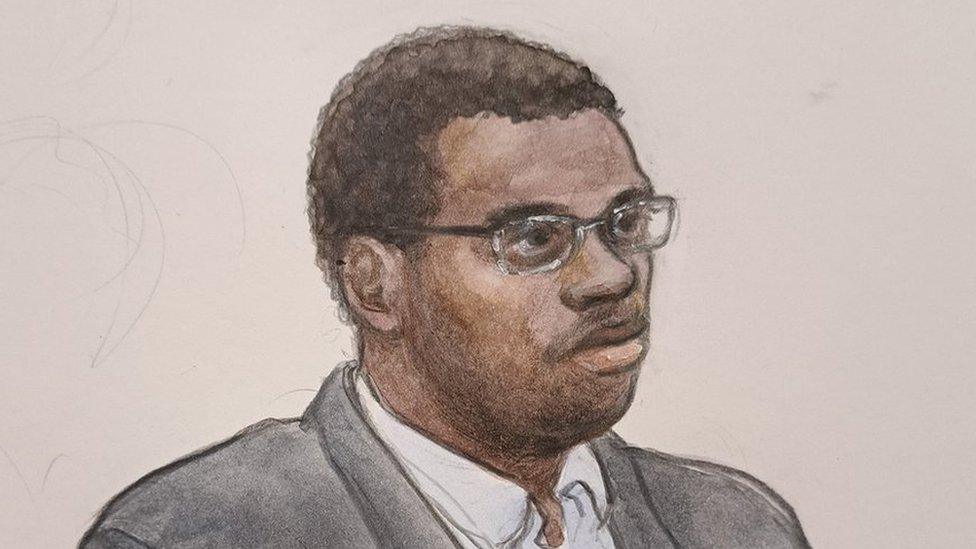
- Published24 January 2024
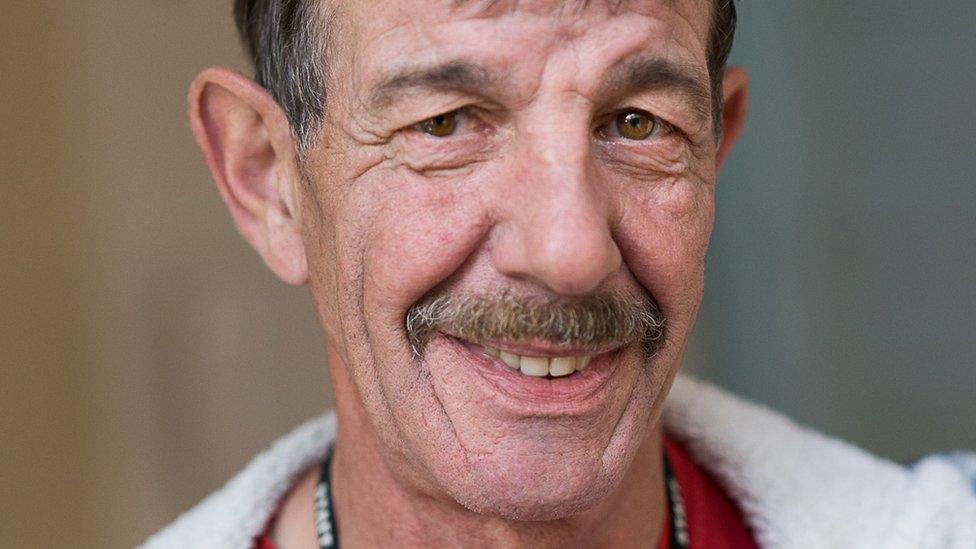
- Published24 January 2024
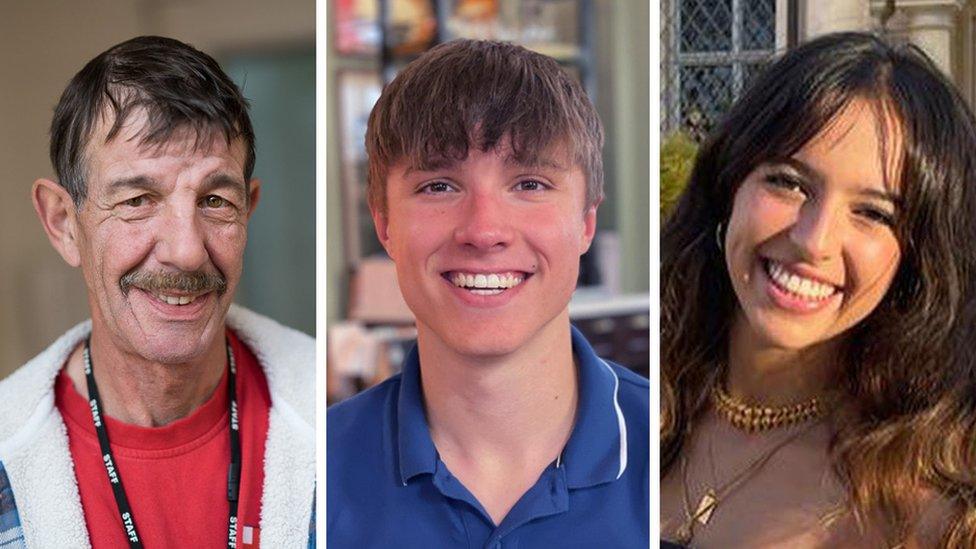
- Published24 January 2024
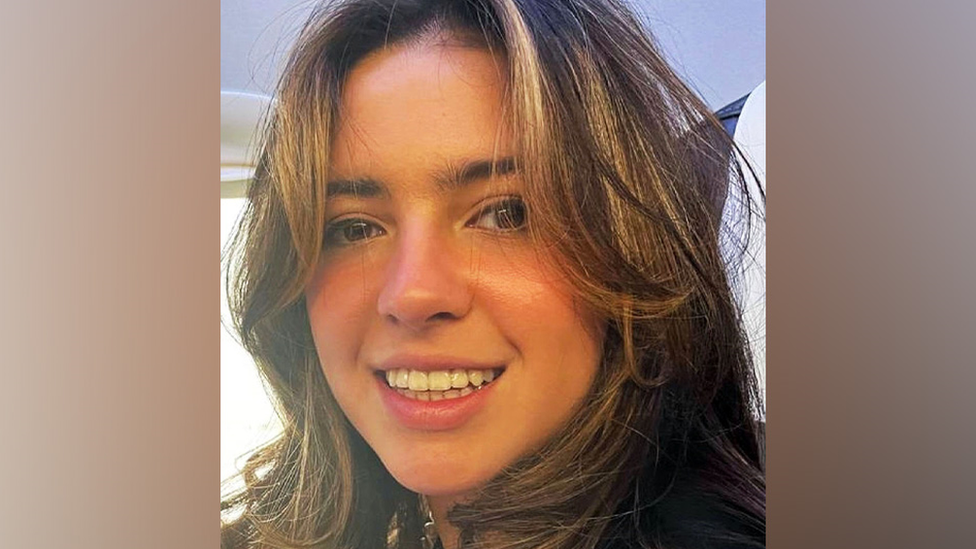
- Published23 January 2024

- Published23 January 2024

- Published23 January 2024
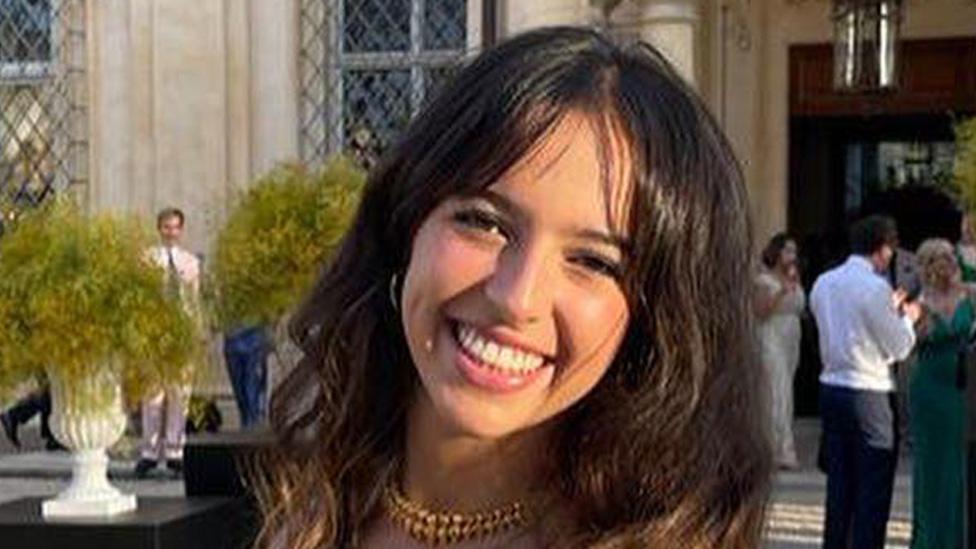
- Published14 July 2023
